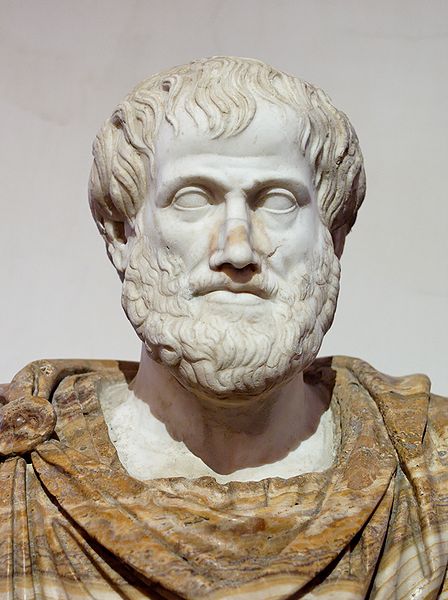March 7: Aristotle
Aristotle (d. 322 BCE)
It was on this date, March 7, 322 BCE, that Greek philosopher and student of Plato, Aristotle (Ἀριστοτέλης, Aristotélēs), died in Euboea. Born on an uncertain date in 384 BCE in Stageira, Aristotle studied with Plato until the older philosopher’s death in 347 BCE, when Aristotle may have been 37. As his writings cover such subjects as biology, ethics, government, linguistics, logic, metaphysics, music, physics, poetry, politics, rhetoric, theater, zoology, Aristotle is ranked as the greatest thinker of the ancient world and an encyclopedic organizer of human knowledge. He was personal tutor to Alexander the Great by invitation of his father, Philip II of Macedon, in 343 BCE. In his early years, Aristotle was a proponent of and contributor to Ionian science, with their atomic and evolutionary theories and their observations of biology and embryology, but he later rejected their sound materialistic view of nature in favor of what might be called “immaterialism.”
Although a student of Plato, it is not correct to group the two. Plato and Aristotle had only one thing in common, and this is rarely revealed in history class: they had very few followers in their time. Plato preached the idea of spirit; Aristotle, founder of the Peripatetic School (περιπατητικός, meaning itinerant, wandering, meandering, or walking about), repudiated the idea of spirit. Instead, he invented a muddled middle ground of the immaterial, saying, for example, that man's mind, while not material, could exist only in a merger with matter. In fact, according to a history of Greek philosophers by Eduard Zeller,* ninety percent of the philosophers in the time of Aristotle and Plato were materialists.
His most important treatises include Physics, Metaphysics, Nicomachean Ethics, Politics, On the Soul (De Anima) and Poetics. After the fall of the Roman empire, the works of Aristotle were lost to the West – putting the lie to the broad claim that Christian monks preserved the classics of antiquity – but in the Middle East the writings of the Peripatetic School were incorporated into early Islamic philosophy. This would come to play a large part in the revival of Aristotle’s philosophy in medieval Europe and during the Renaissance.
A.W. Benn writes at length about his philosophy,** but points out that “for nearly six centuries after his death the Peripatetic school was the least influential in the Greek world.” Benn might have said “twelve centuries,” for Aristotle’s ideas were preserved by Arab thinkers who passed on his philosophy to the Roman Catholic Schoolmen of the Middle Ages. The Church, in turn, imposed Aristotle’s authority upon Europe and seriously stymied the development of science. Indeed, Bertrand Russell would note that “almost every serious intellectual advance has had to begin with an attack on some Aristotelian doctrine.”
To his credit, Aristotle rejected the idea of personal immortality and of a personal God (as a creator and supervisor of the order of nature), and held nature to be eternal: “Men create gods after their own image,” he said, “not only with regard to their form but with regard to their mode of life.” And, “Men are swayed more by fear than by reverence.” But his condemnation of empirical study not only led Aristotle into error, but institutionalized error for centuries in Christian Europe: instead of focusing on his logic, the medieval Schoolmen focused on Aristotle’s metaphysics (μετά + φυσικά or “beyond physics,” that is, reasoning on reality from first principles without empirical grounds) even though there is nothing to be found there.
Aristotle understood politics quite well. He once said, perhaps anticipating Machiavelli, “A tyrant must put on the appearance of uncommon devotion to religion. Subjects are less apprehensive of illegal treatment from a ruler whom they consider god-fearing and pious. On the other hand, they do less easily move against him, believing that he has the gods on his side.” Yet he understood people somewhat less well, observing, “All men by nature desire knowledge.” Furthermore, and this was most destructive to the development of Western civilization, Aristotle was most skeptical of democracy—
In a democracy the poor will have more power than the rich, because there are more of them, and the will of the majority is supreme... Democracy is when the indigent, and not the men of property, are the rulers... A democracy is a government in the hands of men of low birth, no property, and vulgar employment... Republics decline into democracies and democracies degenerate into despotisms.”
* Eduard Gottlob Zeller (1814-1908), Grundriss der Geschichte der Griechischen Philosophie (1883; 5th ed. 1898; English trans. Outlines of the History of Greek Philosophy, 1866 by Alleyne and Evelyn Abbott). ** Alfred William Benn (1843-1915), The History of Ancient and Modern Philosophy (2 vols, 1912), p. 107.
Originally published March 2004 by Ronald Bruce Meyer.


